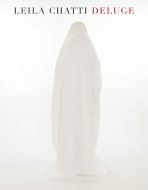 Leila Chatti
Leila Chatti
Deluge
Copper Canyon Press
Reviewer: Maria Rouphail
I collect words like pearls, roll them over my tongue, relish / the sounds they make, knowing they do not / serve me. “Awrah”
By today’s standards, Leila Chatti’s Deluge more than makes the cut. Ethnic and religious identity. Gender and sexuality. The interrogation of societal norms. And a tight autobiographical focus. Check, check, check, and check.
There can be no denial of the book’s formal excellence, too. Or of Chatti’s obvious skill on the page. A dramatic and supple writer, she exemplarily employs her wit in the mordant prose poem, “Sarcoma,” one of fifty-two poems of varying lengths, rhetorical frames, and voices that comprise the collection:
When the doctor says the word sarcoma, I consider how it might be a nice name for a daughter, that good feminine a, the way parents name their children for all sorts of inappropriate things—apples, for instance, or the place where the baby was conceived …
Elsewhere in this book, one finds an abundance of luxuriant phrasing. Here is a sample from another prose poem, “Menorrhagia”: “The storefront windows glaucous, sported with ashen, ineffectual stars ….” And: “Flew home for Christmas, plane niveous as a dove ….” And from “Annunciation,” the second of four poems with that title: “All night the milky curve of the moon / pressed to the window like an ear. “
Chatti is a Muslim, and in the poem “Testimony” she states this fact elegantly: “I am asked what is my religion, and I say surrender.” But she is also conversant in the older language of the Christian scriptural tradition. She marshals this bilingualism to limn the contours of what might be termed the “question of woman” in religion and secular culture—a phenomenon well documented as originating in male authority from time immemorial—only to apply it to a pivotal chapter of her own life.
Front and center here are Chatti’s bout in her twenties (she is now in her early thirties) with a devastating and potentially deadly gynecological condition and the resulting interactions with the medical establishment. Over the course of the poems, Chatti reveals in graphic detail the facts of a uterine tumor that caused her to constantly bleed and the surgery which removed it, “a bald creature with no father / and no future. Savior of no one” (“Myomectomy”).
In shaping her personal story, Chatti turns to Mary, or Maryam, revered in both Christianity and Islam. Mary/Maryam is the foil, the “idea,” and the trope deployed with provocative results, for it seems that in order to resolve the enigma and stigma of her own flawed, rebellious body, Chatti challenges and negates the image of the unsullied virgin who happens also to be the Theotokos of (Christian) scripture. Mary is, ultimately, “not [the] all holy mother”; she is rather the woman “who curses and howls to Hell with salvation” as she labors in childbirth with the “non-savior” (“Confession,” “Saint Baume”). The aim of this refashioning seems to be to demystify the holy woman by asserting her “uncleanness,” making her therefore one with all others and less of an impossible ideal. Indeed, Chatti says she prefers her update to the original, canonical versions.
What most caught my attention about this revision was Mary/Maryam as the victim of a sexual assault and her pregnancy as God’s “[sinking] a boy in her like a stone” (“Litany While Reading Scripture in the Gynecologic Oncology Waiting Room”). Chatti is not alone in opting for this trope. There are antecedents in poetry from Ann Sexton to Sharon Olds. In “Neuse River” (River Hymns, 2017) Tyree Daye writes, “I knew God / was a man / because he put / a baby in Mary / without her / permission.”
I would point out, however, that the textual sources forming the basis for the “idea of Mary” are rooted in an entirely different hermeneutics than Chatti, et al presume to revise. In those (Christian) canonical texts, the annunciation is not a rape story. It is not some first-century remake of Leda and the Swan.
Nor is Mary naïve or duped, although we read that throughout her life she “pondered these things in her heart.” Indeed, the intent of that original story, bound as it is within the cultural strictures of its day, has nothing to do with sexual desire, seduction, forced sexual intercourse, illicit pregnancy, or on the other hand some sort of ineffable purity or perfection (Pius IX’s 1854 encyclical notwithstanding).
Rather, it is firmly a story about origins. Beginnings. Mary is the ground, the terra firma, from which something new springs. She receives an invitation to assume a role in cosmic history, and she accepts it. As any of us does, whatever our sex or gender, when we intentionally take up our lives.
Aside from significant liberties taken with the canonical sources, readers will nonetheless appreciate Deluge for its adroit lyricism and conceptual brilliance. Chatti is a poet of considerable verbal dexterity.
In closing: a friend recently sent me an email with the header,” Did You See This?” It contained the URL to Reginald Dwayne Betts’ New York Times Magazine piece of February 4, 2021, bearing the summary if not also cumbersome headline, “Confession: Leila Chatti’s Poem About Childbirth Reveals that Sometimes It’s Brutally Hard to Be a Woman in This World.” Reading “Confession,” the first poem in Deluge while his own wife was giving birth, Betts was reminded that men fail to comprehend the existential precariousness of women. Betts offered that poetry is either “worthless or essential” to that understanding. Chatti’s poem, he concluded, is the latter. He is not wrong about the hard work of a body birthing another body, whatever the origins.

